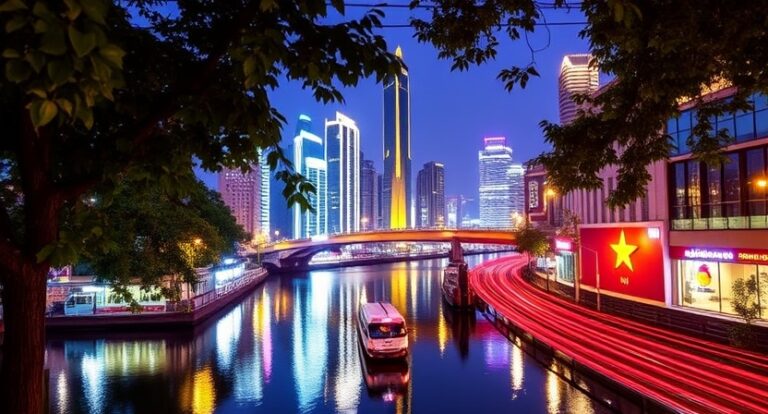Vietnam’s Key Business Hubs: Unlocking Opportunities for Multinational Corporations
Vietnam, with its dynamic economic landscape and population of over 100 million, is a rapidly growing market that offers significant opportunities for multinational corporations (MNCs) across diverse industries. The nation’s population is heavily concentrated in key urban centers like Ho Chi Minh City (HCMC), Hanoi, Danang, Bac Ninh, and other emerging hubs. These cities are not just commercial hubs but also key drivers of Vietnam’s economic growth, attracting substantial foreign direct investment (FDI) and acting as gateways for international trade and business expansion in Southeast Asia.
Ho Chi Minh City: Vietnam’s Economic Powerhouse
Ho Chi Minh City (HCMC), with a population of nearly 9.6 million as of 2024, remains the country’s most vital business center. As Vietnam’s largest city, it contributes 23% of the nation’s GDP and attracts 20% of the total FDI. The city’s rapid expansion is driven by the ongoing development of the Thu Thiem eco-smart city, a US$2 billion initiative that is reshaping the urban landscape and enhancing the city’s connectivity to 12 countries globally. With an allocated VND 2.76 trillion for the second phase of the project, HCMC is positioning itself as a future-ready metropolis, integrating smart technologies, improved infrastructure, and sustainable urban development to meet the demands of its growing population.
HCMC has become a prime destination for multinational corporations looking to tap into Vietnam’s fast-expanding consumer market and access a highly-skilled workforce. Key sectors, including finance, real estate, retail, and manufacturing, are booming, and the city is witnessing the proliferation of international brands and high-end retail outlets, signaling a growing demand for luxury goods and services.
Hanoi: Capital of Culture and Business Growth
Hanoi, the capital of Vietnam, has evolved into a thriving business hub. With a population exceeding 7.7 million in 2023, Hanoi is steadily progressing despite challenges in urban infrastructure and air quality. The government’s focus on transforming Hanoi into a green and smart city by 2030 presents significant opportunities for MNCs in the technology, infrastructure, and sustainability sectors. The city is targeting a Gross Regional Domestic Product (GRDP) of US$36,000 per capita by 2045, indicating strong future growth.
Hanoi’s proximity to key regional markets and the government’s investments in infrastructure, such as the Nhat Tan-Noi Bai economic zone, make it an attractive location for investors in the high-tech, automotive, and consumer goods sectors. The city’s developing digital economy, along with its expanding role as a center for knowledge-based industries, offers considerable business opportunities for MNCs.
Danang: Vietnam’s Emerging Tech and Manufacturing Hub
Danang, located in the Central Region of Vietnam, has emerged as a key city business center, attracting foreign investors due to its strategic location, world-class infrastructure, and access to the Central Industrial Region. With a population of 1.19 million, Danang boasts a rapidly developing economy, driven by industries like IT, hi-tech manufacturing, and retail. The city has become a magnet for multinational corporations, particularly in the tech sector, with 43% of its businesses operating in information and communication technology (ICT).
Danang’s transport infrastructure, including its international airport and seaport, positions the city as a crucial gateway for international trade and logistics. The government’s focus on nurturing a dynamic, young workforce and investing in education further supports its appeal for businesses seeking skilled labor. Despite challenges such as a relatively small population size, Danang remains an attractive option for investors looking to set up operations in the heart of Vietnam.
Bac Ninh: A Manufacturing Powerhouse
Located just north of Hanoi, Bac Ninh is a rapidly developing industrial hub that is becoming increasingly attractive for foreign investors. Known for its VSIP Bac Ninh industrial park, the region has seen significant growth in recent years, with its GRDP increasing by 10.04% in 2022. Bac Ninh is particularly renowned for its manufacturing capabilities, with a focus on electronics, automotive, and smartphone production.
The region’s proximity to Hanoi and its access to international transportation links via airports and seaports make it a strategic location for multinational corporations in the manufacturing and logistics sectors. With a skilled workforce and favorable government policies, Bac Ninh is emerging as a key player in Vietnam’s industrial development.
VSIP Binh Duong: Industrial Excellence in the South
Binh Duong, home to VSIP II Binh Duong, is one of the leading industrial zones in Vietnam, with a population of nearly 3 million people as of 2023. The region has experienced a strong growth trajectory, with its GRDP increasing by 7.91% in 2022. As a key part of the southern economic zone, Binh Duong is a favorite destination for multinational corporations looking to expand their operations in the hi-tech, electronics, and manufacturing sectors.
The government’s investment in infrastructure, along with its smart city initiatives, is making Binh Duong a competitive business hub. While the region faces challenges related to workforce shortages, its emphasis on developing high-tech industrial parks and supporting innovation makes it a lucrative location for companies looking to tap into Vietnam’s rapidly growing economy.
VSIP Hai Phong: Gateway to the Northern Economic Zone
Hai Phong, a key port city in northern Vietnam, is emerging as a vital business hub for foreign investors. The region’s VSIP Hai Phong industrial park is a major draw for companies in the automotive, logistics, and consumer goods sectors, thanks to its strategic location near the Hai Phong Port and its proximity to Hanoi. The city’s economy reached a growth of 12.32% in 2022, and its potential as a manufacturing and logistics hub is increasing as the government continues to improve infrastructure and offer investment incentives.
Hai Phong’s growing infrastructure, coupled with its investment-friendly policies, makes it a prime destination for MNCs seeking to establish a foothold in northern Vietnam. However, challenges such as the rising cost of building materials and competition from other industrial centers should be considered by investors.
Phu Quoc: Vietnam’s Rising Tourism and Business Destination
Phu Quoc, while not as populous as other key business centers, is gaining attention due to its booming tourism sector. The island’s tropical climate, luxury hotels, and natural beauty make it a hotspot for tourism and real estate development. As Vietnam’s premier tourist destination, Phu Quoc is seeing rapid growth in hospitality, retail, and infrastructure development, which is creating new business opportunities for multinational corporations in the tourism and luxury goods sectors.
While the region faces challenges related to its early-stage development and vulnerability to climate change, Phu Quoc’s continued rise as a top destination for international tourists presents significant potential for companies in the hospitality and luxury sectors.
Conclusion: Vietnam’s Strategic Advantage for MNCs
Vietnam’s diverse business centers—ranging from the dynamic Ho Chi Minh City and Hanoi to the emerging industrial hubs of Danang, Bac Ninh, and Hai Phong—offer a wealth of opportunities for multinational corporations. As the country continues to grow its smart cities and infrastructure while attracting foreign investments, it remains a highly strategic destination for businesses looking to expand in Southeast Asia.
Vietnam’s combination of a growing middle class, access to global supply chains, and government-driven initiatives to create a future-ready business environment make it an ideal location for companies in technology, manufacturing, retail, and services. By leveraging these key cities’ strengths and the favorable investment climate, multinational corporations can tap into one of Asia’s fastest-growing economies.
For investors looking to navigate this rapidly evolving landscape, partnering with local experts such as InCorp Vietnam can provide invaluable insights and support in establishing and expanding operations across the country.

